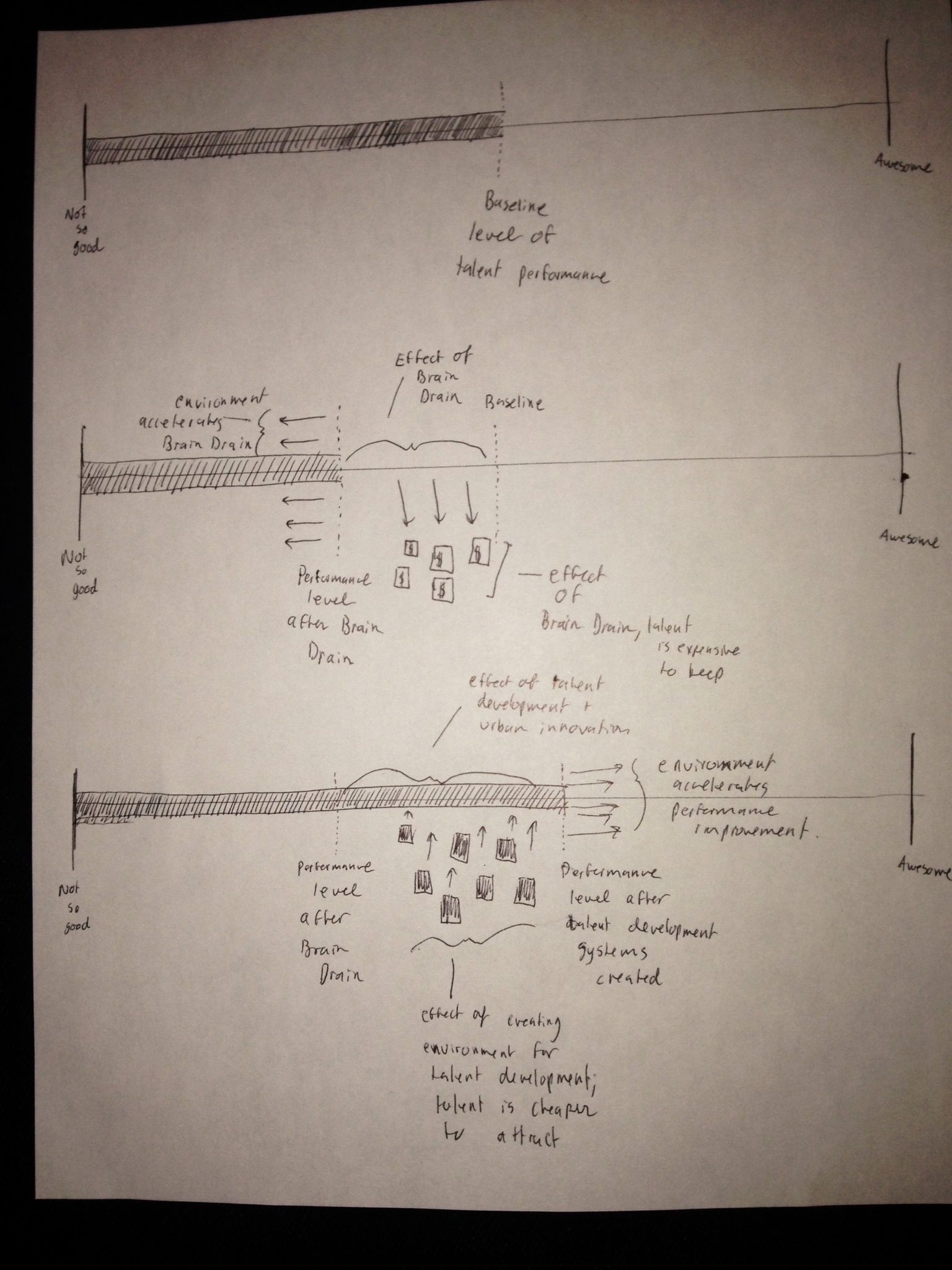Focusing On Michigan's Brain Drain is a Miss
The conversation about brain drain in our state is common and (sort of) well researched. This entire discussion, though, is problematic. Averting brain drain via direct programs is the less effective (and probably more expensive) strategy. Creating strong communities and vibrant cities is a better course of action. Breaking down the issue
Check out this chart below. Give it a look over and then I'll explain what I am trying to convey. A quick definition - the way I "talent performance" is this: talent performance is the product of talent quality and talent quantity --> Talent Quality x Talent Quantity = Talent Performance.
These axes are representations of the level of talent performance in Detroit and the State of Michigan more broadly. The bigger the bar, the better our talent is performing and the better off we are with regard to talent. For discussion's sake, let's say the top graph is the current level of talent performance. The baseline level there is represented by the dotted line.
The middle graph represents brain drain. Basically, in brain drain people leave the state, which lowers our overall level and quality of talent. These departures decrease the level of talent performance in the state, hence the smaller bar. The distance between the two dotted lines is the effect of the brain drain. Now, as people are leaving the state, lawmakers and business leaders are trying to respond by wooing talent to prevent them from leaving, or wooing talent outside the state here.
This is a reasonable strategy, except that it's a foolish one. Wooing talent is very expensive. You have to give departing talent lots of resources and you have to 'wine and dine' them, so to speak. You have to invest lots of money in programs and you might even have to subsidize their wages. All this is very pricey.
What's worse is that all this time and money spent on wooing talent doesn't really have ripple effects to the rest of the citizenry. If you woo someone to Michigan by paying them more, for example, it doesn't make a neighborhood in Detroit directly better, the only person that benefits substantially is the person who was wooed. The dollars you spend don't have effects on other things to make other parts of society or other people better, in a meaningful way. And, if you spend money to woo someone, that person may never be fully satisfied unless you keep wooing them which burns even more of hole in the state's pocketbook. Just like subsidies for other products and services, once you provide a subsidy, people start to expect it.
The bottom graph, demonstrates what happens when creating an environment that develops talent and gives it the space to grow on its own. Said differently, this is a representation of what happens when you make communities better and make cities more vibrant. By improving the environment for talent, the talent that is already here gets more effective and performs better. The baseline level of talent performance increases; the bar gets bigger without more people needing to be here. Moreover, when you create a great environment, people come here on their own. People want to be part of excellent environments so they find their way here because they see opportunity, prosperity, and happiness. You don't have to woo them with one-off programs or compensation packages. This is much cheaper than rolling out the red carpet to bring people to Detroit.
Make no mistake, building communities and making cities more vibrant isn't cheap or easy in the absolute sense. In fact, it's probably expensive and really, really hard. But it's still better than wooing talent in an ad-hoc fashion because the dollars spent to make cities and communities better has all sorts of unrelated positive effects. The people in the community probably become happier if their community develops. There's probably lower levels of crime. People are probably more educated and involved in government and other aspects of civic life. By building communities and making cities more vibrant, the dollars spent provide returns years and years later. The people being wooed to come here are definitely NOT the only people who benefit substantially from the effort. On the contrary, when you build communities and cities, the whole community benefits.
Here's the takeaway: we should be focused on creating a great environment for talent by building up our communities and creating vibrant cities instead of trying haphazardly to prevent brain drain at high cost. That's ultimately what will be more beneficial for the city and state in the long run. Trying to combat brain drain directly is expensive, and it might not even work.
Moreover, this is possible - saying, "it's too hard" or "we don't know how" is a poor excuse. The work I was part of at the Center for the Edge is a great piece of research explaining the framework for thinking about how to create innovative, performance-improving environments. Also, look out for a report coming through from Detroit Harmonie soon. I can't really discuss it yet, but it's cool stuff.
Let's get serious about building great communities instead of wasting our time on conventional wisdom of attracting talent solely to prevent brain drain. Quite literally, if we build great communities and vibrant cities talent will come. So let's focus on that.
---
Holler at me with stuff I should rehash. This is a pretty intense topic.
If you enjoyed this post, you'll probably like my new book - Character By Choice: Letters on Goodness, Courage, and Becoming Better on Purpose. For more details, visit https://www.neiltambe.com/CharacterByChoice.

